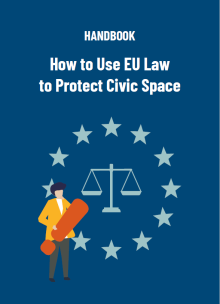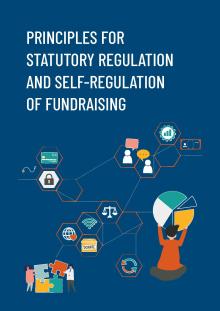In order to finance its response to a public health emergency, a government cuts public funding to civil society organisations (CSOs) and imposes a new tax of 25% on all foreign donations received by organisations defined as “entities pursuing objectives in the public domain and which are of a political, religious, patriotic, philosophical, philanthropic or civic nature“. The purported rationale is that these entities, which are expected to act in the public interest, should devolve their sources to support the state’s response to the emergency.
The measure affects a great number of CSOs, which fall under this definition of public interest entities. While agreeing on the importance of contributing to support the government’s response to the emergency, CSOs feel that their contribution could have been secured in other ways. Already confronted with reduced financial resources and with an overall hostile climate, CSOs believe that this measure seeks to unduly curtail their right to access and dispose of funding, ending up endangering, for many, their very existence.
Cutting funding as a way to close down civic space
CSOs’ ability to seek, receive and use funding is a core component of the right to freedom of association, as adequate resources are obviously essential to the existence and effective operations of any organisation. The multiplication of obstacles affecting CSOs’ ability to seek, receive and use funding, both from local and external sources, reflects a devious form of government’s repression of the civil society space.
These restrictions are all the more detrimental in an overall crisis context, where funding possibilities for the associative sector are already reduced. Indeed, governments willing to target what they consider hostile CSOs may be tempted to use a public emergency as a pretext to cut down on CSOs’ access to local and foreign funding by means of legal, administrative or practical measures. The EU is not new to national laws and practices stifling CSOs by interfering in their access to and use of funding. In Hungary, a law not so different from the one described in this example was adopted in 2018 – despite the joint opinion of the Venice Commission and ODIHR considering the law as incompatible with, among others, the right to freedom of association.
CSOs may rely on EU law to safeguard their access to funding
National measures affecting CSOs’ access to funding may come into conflict with a number of EU law obligations.
EU internal market freedoms may come into play, in particular, in relation to restrictions having a cross-border impact, including measures targeting foreign donations, as in the example above.
Clearly, foreign donors might be dissuaded from making donations to CSOs if, as in this case, national taxation measures resulted in a significant reduction of the amount the beneficiary CSO could effectively dispose of. In such a situation, it may be argued that the government is violating the free movement of capital, according to which any restrictions on capital movements and payments across the EU is prohibited (Article 63 TFEU). Free movement of capital may, indeed, be relevant to donations as a form of transfer of capital, and a measure targeting foreign donations may result in an unjustified discrimination based on nationality, as argued by the European Commission in a pending case against the Hungarian law on foreign-funded organizations.
Similarly, it may be argued that a tax measure such as the one described would result in an obstacle for foreign CSOs to establish themselves in the country concerned, assuming that the main source of funding for such organizations would come from abroad and thus be hit by such severe cut. This could be contrary to the freedom of establishment (Article 49 TFEU), which grants the right to set up agencies, branches or subsidiaries in other member states to any organisations (including CSOs) involved in some form of economic activities, even non-profit. As a result, when challenging these national measures for their incompatibility with internal market freedoms, a violation of the right to freedom of association could also be claimed based on Article 12 of the EU Charter of Fundamental Rights (CFR).
How should violations be addressed?
Violations of EU law, including the CFR, can be claimed before national courts, which should examine and rule on the matter, possibly requesting the assistance of the EU Court of Justice. Independent national authorities, like the national human rights institution, may provide advice and may take up the issue by approaching national authorities or through litigation, if their mandate allows. National laws and measures which result in systemic violations of governments’ EU obligations can also be brought to the attention of the EU institutions through complaints addressed to the European Commission or petitions addressed to the European Parliament. The body responsible for monitoring the respect by EU governments of their obligations under EU law is the European Commission, which can take steps to inquire the matter and can, if it establishes a violation of EU law, start formal infringement proceedings against the country in question.
Check out our new Handbook on How to use EU law to protect civic space for more guidance!
ECNL, in partnership with EFC and DAFNE, just published a new handbook intended to provide practical guidance for CSOs to advocate and litigate using EU law to protect their rights and civic space.
in the EU. Check out our user-friendly guide to know more on:
- What EU law is and how it affects individuals and organisations;
- When and how CSOs can challenge national provisions or measures that impact their mission, activities and operations on the basis of EU law, including the CFR;
- Which legal avenues and resources are available for CSOs to defend their civic space within the EU law framework.
…and our new Fundraising Principles on how to promote better environment for philanthropy!
ECNL, together with ICNL and a group of key experts, developed Principles for the statutory regulation and self-regulation of fundraising to promote a more enabling environment for philanthropy around the globe. The Principles provide a global overview of current trends and offers principles and recommendations under 7 key areas, based on international standards and examples from 70 countries. Some of the key principles formulated under the area of cross-border fundraising are the following:
- States do not impose restrictions or intrusive procedures on CSOs to receive and use international funding and on the outflow of domestic funding to CSOs abroad.
- States guarantee equitable tax treatment for cross-border and domestic donations.
- CSOs receiving international funding are not stigmatized, labelled as foreign agents, or attacked in public media, by the government, or by third parties.
You can use the Fundraising Principles to:
- Assess existing or proposed legislation or regulation impacting philanthropy;
- Facilitate discussions about how existing laws, regulations, and practices could be improved in the light of the standards and good practices;
- Develop recommendations and support advocacy efforts to create an enabling environment for private giving within and across countries.

